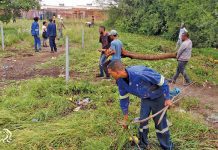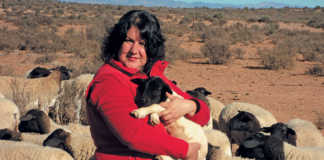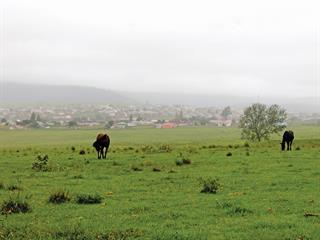Cross-border stock theft between KZN and Lesotho became so bad in the mid- 1990s, that a large number of landowners in the Swartberg region simply stopped farming 18 000ha of valuable grazing between Joyner’s Gate and Jonathan’s Gate – a 22km stretch along the province’s South Africa-Lesotho border.
This vast area of rugged mountains should have acted as a buffer to deter Basotho stock thieves from further plundering the animals of the 22 farmers adjoining it, but it didn’t. Instead, thieves simply began walking further into KZN, even as far as Ndawana and Ntsikeni, to steal animals. Most SA National Defence Force (SANDF ) border patrols, SA Police Service (SAPS) officers, and provincial government Stock Theft Units (ST Us) proved woefully ineffective against the scourge of theft, leaving farmers the stark choice – either give up farming or start an anti-stock theft programme of their own. The latter was chosen and the Swartberg Stock Theft Prevention Association (SS PA) came into being.
Desperation, the mother of invention
The two farmers instrumental in setting up the programme, and also in keeping it going, are Ken Dorning and Stephen Gilson. Ken is the chairperson and Stephen coordinates practical aspects, with his wife Shannon serving as secretary. “When we set up the SSPA in 1995, our intention was to have a formal structure to prevent rampant stock theft from our area and into Lesotho, and to allow us to execute our own stolen-animal recovery operations,” Ken says. “We approached the Zwartberg Farmers’ Association (ZFA) for financial assistance in getting the project off the ground, but were told, understandably, that the ZFA simply couldn’t put large amounts of money into a project that stood to benefit only a small proportion of its overall membership,” Stephen remembers.
“Some government departments and other organised agricultural institutions also promised us help, but to be honest, most of this has never materialised. So we members of the SSPA decided to pay for the project out of our own pockets. That’s of course on top of the taxes we pay that should be used to protect our livelihoods.” The running costs of the SSPA amount to over R600 000 annually. The money contributed monthly by the 22 farmers is put to good use and, over and above the daily costs, has financed the construction of Thuli Pass, a rugged 14km mountain road used to access the Lesotho border.
Maintenance costs of the pass are also carried by the SSPA, despite the army having used it on a regular basis to deliver supplies to troops positioned on the border. The road allows farmers to mount easier follow-up operations for stolen stock with motorbikes and 4×4 bakkies. It is also used to service the SS PA guards on the border. They live in storage containers placed at strategic points along the border and patrol their allocated section between Joyner’s Gate and Jonathan’s Gate every morning. Carrying no weapons, they report any suspicious movements of stock to the SSPA by radio.
“At the inception of the SSPA, the border fence along our patrolled section had been stolen,” Ken says. “People could move across this border as they pleased and often still do, although the traffic has been greatly reduced in recent years. The SSPA decided to construct, once again at its own expense, a regular fivestrand, barbed-wire cattle fence along the 22km border under its watch,” he says. “Thieves trying to move cattle across this boundary would then have to cut it, leaving an obvious sign of their point of entry into,or exit from, Lesotho, making it easier for our guards or SSPA members to track them.”
The stock-theft prevention operation proved to be quite successful, and after 10 years the value of stock stolen annually has been reduced from R1,4 million to R200 000. A large percentage of the stolen stock crossing the border also happened to be from the Ntisikeni and Ndawana areas, and while the black farmers in those areas also have had their cattle regularly recovered, they aren’t contributing to the cost of the operation. “A major concern is the ever-rising cost of running an ‘international border’ operation, financed by farmers with zero financial contribution from the government,” Ken says. “In late 2005 we heard of the success of Operation Charlie, set up by the Eastern Cape SAPS in 1995 under inspector Kenny Moolman.
The idea was to establish strong working relationships with local black communities that would provide police with information on the illegal cross-border movements of stolen livestock and dagga. “So we decided to adopt and adapt the principles of Operation Charlie for fighting stock theft in our area.” Operation Charlie is based on radio communication via high-frequency radios strategically placed inside Lesotho and SA.
The communication radios have been a pivotal aspect of the success of the SSPA’s version of Operation Charlie. Not only do they link the association directly with its border guards to allow quick follow-up actions after a theft, but they have even contributed to a positive working relationships between the SA farmers and their Basotho counterparts. In the Eastern Cape’s Operation Charlie, radios are purchased by the SAPS, but in the Swartberg, the cost is borne by the assocation. The Agri Securitas board, through Kwanalu, has pledged to contribute R38 000 towards the cost of the radios, and Voermol has also pledged R48 000, payable over three years.
Building cross-border relationships
“The Basotho farmers’ animals are also stolen by both South African stock thieves and their fellow Basothos,” Ken says. “In a country where rural anti-crime and support structures are virtually non-existent at the best of times, these Basotho farmers are more than willing to cooperate with the SSPA to fight stock theft.”
The SSPA has found it invaluable to supply communication radios to trusted members of the Lesotho farming communities, where most stolen animals from SA pass by. The current radio holders of the Moshai and Sehlabathebe communities in Lesotho have been selected by their own people as being the most trustworthy to hold these important positions. The SSPA visits these communities once every two months to participate in meetings of the communities’ respective livestock owners’ associations. Farmer’s Weekly has attended two of these meetings, and has witnessed how vehemently opposed Basotho farmers are to stock theft, how enthusiastic they are about their relationship with the SSPA, and how grateful they are for the ability to make it as difficult as possible for stock thieves to continue their illegal activities.
“We have had a phenomenal response from these Basotho communities to our programme,” Stephen says. “We have cultivated valuable informers in Lesotho who tell us about anything suspicious going on.” But with Basotho stock thieves now finding it more difficult to steal commercial farmer’s cattle, they have turned their attention to the animals of black farmers in Ntsikeni. That’s when the SS PA decided to invite the leadership of the Ntsikeni Farmers’ Association, representing black livestock owners, to make use of their resources to track their stolen cattle. “We want to stop that problem too,” Stephan points out.
The SSPA has found that only a small handful of officers in the South African policing and stock-theft units in its region take their work seriously. And among this minority, the association has only the highest praise for constable Bryant Mdingi and Inspector Mnguni from the Evatt Police Station, as well as Captain Bommie Dreyer of the SAPS Crime Intelligence Gathering division. Not forgetting Inspector Kenny Moolman and his direct superiors, who have contributed invaluable input to assist in establishing Operation Charlie in the Swartberg area.
However, the same cannot be said for the Matatiele Stock Theft Unit. When the SSPA and Farmer’s Weekly paid a surprise visit to this unit’s very isolated Bellevue outpost on the SA-Lesotho border, it found a single police officer manning the outpost in very primitive conditions. Bellevue’s radio wasn’t working, and allegedly hadn’t been since the beginning of May this year. The police officer on duty could not make cellphone calls, and could not patrol the border or make arrests because he had no support.
His only activity was to feed the five horses belonging to the Matatiele STU, which were not being used anyway. “This is shocking,” Ken said. “Nobody at Matatiele has made any effort to see why this policeman has not been in contact for the past month. He could be sick, his food or the horses’ food could run out, and yet he is stuck out here with nobody to help him. Apart from the fact that he’s working under almost inhumane conditions, what exactly can he do to stop stock theft or other cross-border criminal activities? It’s terrible.”
Plagued by broken promises
Even organised agriculture has left the SSPA in the lurch. The Agri Securitas Trust Fund promised the SSPA R38 752 to purchase radio equipment to assist the association in combating stock theft. Taking the promise in good faith, the association went ahead and bought equipment with its own money. Yet, nine months later, no money from the Agri Securitas Trust Fund has materialised. But although the SSPA, together with Basotho farmers, Nstikeni farmers, and diligent members of the SAPS, has struck a meaningful blow against stock theft in the area, the association is increasingly concerned about the future financial sustainability of its operations.
Yet even as its budget becomes tighter, its members say they will fight on until it they no longer can. “We need to have continuity in all spheres of the fight against stock thieves,” Ken says, before adding, “The police and the government must stop transferring relevant skills away from our area as soon as they have had time to develop to effective levels. “We want to make the Evatt Police Station the central node for our Operation Charlie, but we can’t do this when our police supporters are moved away as soon as something productive starts being done. “Government must come to the party and provide us with funds, and organised agricultural bodies must join in this fight as well. Bureaucracy must also be done away with because, in the end, it is exceedingly counter-productive, and works against protecting the assets of all SA’s farmers.” Contact the SSPA on tel/fax (039) • 747 4580.













